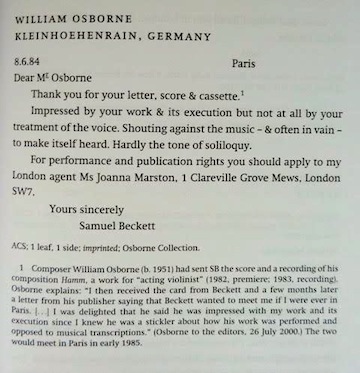
Enlarge to read. Samuel Beckett to William Osborne
from ‘The Letters of Samuel Beckett: Volume 4, 1966-1989’
We sat in a café across the street from his apartment and talked for exactly an hour. He always met people in that café instead of his apartment so he could get up and leave if he didn’t like them. He was wearing a big overcoat and didn’t take it off so I figured he would quickly leave, but he seemed to enjoy our discussions. From time to time he would unbutton a button on his coat. His coat was mostly open by the end of our visit. I wondered if people judged the success of their visits by how many buttons he undid.
If you’re interested in hearing an excerpt of Osborne’s music, here’s one. (It’s not from the composition he sent Beckett.) The trombone is played by Abbie Conant. The score lets you follow along.





Yes, I’ve read the first two volumes and can’t say I’ve found Beckett’s letters very interesting. It may be my own fault, meaning his work has developed such high expectations in me that the day-to-day stuff of his correspondence can’t possibly compare.
In a way, though, I think your crack about Beckett concurring with the dullness of his correspondence may be on point. After all, his work gave evidence of an increasing sense of exhaustion as it progressed. We celebrate it as minimalism yet his later texts have all the vim and vigor of cardboard. Beckett wasn’t kidding when he wrote “imagination dead imagine.” I’m not saying those later works are valueless, only that they may well be the literary side of an épuisement that we see in his letters from the get-go.
In the end, I think the Oxford volumes of Beckett’s correspondence would have done him better service by being even less comprehensive than they are. One volume of gems would have been preferable with perhaps the rest published online for scholars. As it is, the four volumes drag and make you long for the insight into creative process that Flaubert shared in his letters or for the hilarious routines that Burroughs composed in his.
Thanks. I posted this, if truth be told, as an excuse to display Osborne’s music. What you’ve said gives the posting some needed literary oooomph.
Love the undo-buttons story. But think the reason for cafe meeting places is off; unless you’re loaded in Paris, you live in a tiny apartment–so meetings (except for trysts) take place in cafes. Similarly in Tokyo, except that meetings are in grand hotel lobbies.
Maybe so. But I take Osborne’s point as accurate.
Beckett made it well known to his friends and biographers why he met with people in the cafe across the street from his house. To get up and leave is much easier than getting people out of your house. He did not suffer fools, and I suspect many wanted his attention. When talking to someone like Beckett, one wants the discussion to go on for hours, of course. I’m sure he needed a system of keeping things in proportion. Also, he wasn’t as short on space as most Parisians. At some point he bought the apartment next door to his and used it for his work space.
I agree with Keith that Beckett’s later works are perhaps not as great as his major plays, but I still think they are very valuable — in some cases tiny masterpieces, like “Rockaby.” In fact, I set two of them to music, “Rockaby” and “Ohio Impromptu.” His late plays are all short and use limited resources. Beckett felt that theater needed a corollary to chamber music. Most of his late plays seem to be attempts toward that goal. A recording of my setting of “Ohio Impromtu” made by the Hessian State Radio in late 1986 is here:
http://www.osborne-conant.org/Ohio.htm
Thank you for the kindness of noting my work, though it too might seem like cardboard to many.
Also, I forgot to mention that I find the letters very interesting. They provide many insights for those who have read Beckett’s biographies and who have dealt closely with his work. His writing style was so unique and special that just about anything he wrote was interesting to me. The fastidiousness and musicality of his language is apparent even in his missives.
Forward has an interesting article arguing that his letters reveal how close his ties were with the Jewish community, how his life as an exile from his country gave him a special sympathy for Jews, and how the letters reveal his roots in the resistance.
http://forward.com/culture/144905/samuel-becketts-letters-reveal-roots-of-resistance/
And the NYT wrote about an earlier volume of the letters here, noting that they reveal much about his work:
https://www.nytimes.com/2014/12/14/books/review/the-letters-and-poems-of-samuel-beckett.html?_r=0